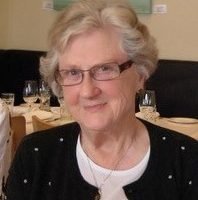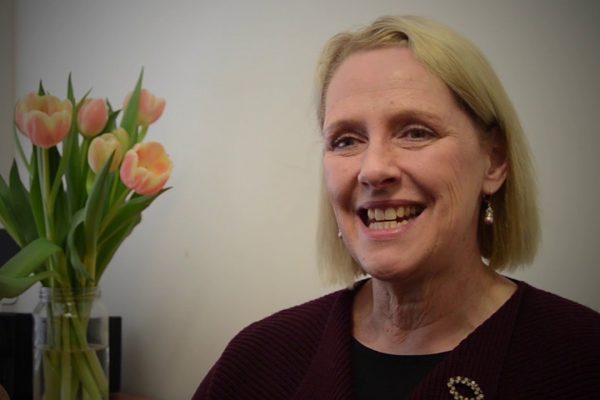Eileen Harrison
11 October 1930 – 8 December 2020

Author: John Harrison, Eileen’s son
Eileen was the only child of Hannah Murnane and Roland Mumford – a marriage between a Catholic and a Protestant.
Hannah was born in Killarney, not in County Kerry, but a tiny place just near Koroit and Warnambool in south west Victoria. It is a beautiful part of the world and I always thought it was there, amongst her mother’s family, where Mum was happiest.
Hannah was kind, quietly spoken and with a gentle incisive intelligence – she taught me to read.
My grandfather Roland was a sterner figure, born in the Army barracks in Queenscliff in 1900 – he was a capable man who didn’t suffer fools, gladly or otherwise. In the First Word War he was demoted for “dumb insolence” to English officers. Twice.
Eileen was a bright child, with a sense of humour, academically capable, a piano player and a voracious reader. She had flaming red hair, which she passed onto me (at least for a while) but I wasn’t able to pass on to my children.
She was an excellent tennis player who played B Special pennant and she played until well into her 70’s when she was comfortably outclassing women 30 years younger.
Every Sunday her family would make the trek from Preston to visit her paternal grandmother in Hawthorn at 42 Wattle Road.
When Margaret and I bought our family home in Wattle Road 60 years later she was very excited and took great delight in telling me about the streetscape and the residents from when she was a child.
I understand those visits were quite formal . As a young child, Mum had dared to burst into Sunday dinner when the adults were dining and was asked by her grandmother “Eileen, what do you want?” to which she replied “Nothing Grandmama” and in response was told “Well, take it and go”.
Mum matriculated from high school and from there she went to Melbourne University, becoming a teacher. When I was completing an Arts Degree in University of Melbourne in the 1980s, I used the anthologies of Wordsworth, Blake and Milton that she had carefully annotated whilst doing her Arts Degree in Melbourne University 30 years earlier.
She didn’t teach for long as when she told the Department of Education she intended to get married she was told there were no jobs for married women.
Mum married my father Tom in 1960. They moved to a brand new cream brick veneer house in Winmalee Road in Balwyn. It looks just like this church – All Hallows – but with lower ceilings.
And they rapidly started a family, I was the first born, just over 9 months after the wedding, and then followed by my sister Joanna in 1965.
It seemed to me a happy marriage. It was certainly a marriage of its time. I could set my watch to Dad leaving in the morning and arriving home at night. The family came here to Mass at All Hallows every Sunday, restaurant visits were non existent other than fish and chips on a Friday night. Jo and I both went to the local parish primary school. Every summer we went to Rosebud for a fortnight.
Eileen valued education. She was very proud that both Jo and I ended up with Law and Arts degrees from the University of Melbourne (Jo’s degrees being more distinguished than mine). I think it meant more to her than it did to us. She certainly told more people about it than we did.
After my father retired, unfortunately he became ill, and Mum selflessly looked after him until he passed away.
Eileen then sold the family home and moved to a unit in Cherry Road, Balwyn. She was fiercely independent and appeared to genuinely enjoy living alone, though there was always time for friends and family and to travel around Australia.
And then there were grandchildren. She was not a clingy grandmother but she was endlessly interested in each of them and every time she saw a grandchild he or she would be interrogated as to what they were studying, what they were reading and what were their plans. Reasonably tough questions for a 5 year old. And if she couldn’t speak to a grandchild, she would interrogate me.
When my children were growing up we used to have something called “Nana dinner” which was held on the last Sunday of every month. The attendees were my mother, Margaret’s mother Alice, Pat Tonks (one of Mum’s old friends) and Kathy McDermott (a neighbor from our first house in Hawthorn). All the women were over 80 and at that time all in good health and they all ate and drank for Australia. The men of course were all dead.
My children also had a great love of what they called “nana stories”. The truth of the matter is that my mother was rarely silent. And her stories were sometimes difficult to understand as in her eagerness to tell them bits got left out – like names – and doing words – a typical story was “I met someone in the street – you know who – no I don’t – yes you do – what is their name – you went to school with them – that doesn’t narrow it down – in any event, they said something – it was very amusing”. Well perhaps. It was hard to tell.
After a decade of independent living, her health began to fail, and she had to move from Cherry Road to Lynden Aged Care.
At Lynden, I was impressed that she knew the names of all the staff and would happily talk to all of them. Of course, that meant that everyone I met at Lynden knew everything that there was to know about me and my family.
Over the last 3 years or so I had an unfailing pattern every Friday morning – I would go to Dan Murphys, buy Mum a bottle of whisky, go to Lynden and we would sit and have a cup of tea and talk. It was a gentle routine. During COVID, I was not permitted to visit her in the facility so I would stand outside the fence near her room as she sat in her garden. And I would pass the whisky bottle through the fence and she would give me the empty.
Mum remained mentally alert even as she physically declined. Every day she would read The Age from cover to cover and she was a star performer in the trivia competition.
When Mum turned 90 in October because of COVID we couldn’t have a party. Margaret and I visited her and talked through the fence as she sat in her garden, like she was resident in a low security prison. But her highlight was that all of her grandchildren rang her and wished her happy birthday. Every time I spoke to her after that she told me how happy it had made her to hear from the grandchildren.
But having survived the worst of COVID her health failed a final time and then she talked no more.
Eileen was devoted to her family and to her friends – she was an excellent wife, mother, grandmother and friend – she had a long and good life for which we are all grateful. She will be missed.




Comments
Add Comment